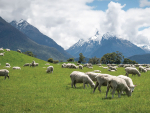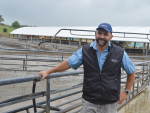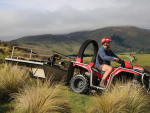Hot, muggy conditions this year were a pointed reminder to dairy farmers to breed animals more tolerant of facial eczema (FE) and more resistant to the disease long-term, says CRV Ambreed.
The company’s genetic development strategist Phil Beatson says R&D in the past four years by its staff and AgResearch allow identification of FE-tolerant bulls.
Sires now entering CRV Ambreed’s progeny test programme are challenged for FE tolerance, and targeted genetics are available to help farmers beat the disease long-term.
Beatson says the firm’s genetics for dairy cattle will typically breed offspring that are 25% less reactive to a FE challenge than an average bull.
“It isn’t an overnight fix though. A dose of facial eczema tolerant genetics this season will help minimise the loss of milk production in the progeny in years to come,” Beatson said. “Farmers need to consider the genetic option to combat facial eczema, and they need to get on the bus now and stay on that bus.”
Cattle in many parts of the North Island and upper South Island were hit by FE this year. Higher humidity increased the number of toxic spores in pastures and resulted in a spike in the number of FE cases.
Clinical cases of FE are easy to spot; skin loss and lethargy are clear signs. In extreme cases FE may cause an animal’s skin to fall off and even kill it. But invisible subclinical symptoms cost the dairy industry more through the loss of milk production.
FE tolerance is a heritable trait and the right breeding programme can reduce the severity of the disease CRV Ambreed says.
Sheep farmers have shown the dairy industry how the disease can be addressed long-term: sheep today are up to six times more tolerant to a FE than sheep were 30 years ago.


















